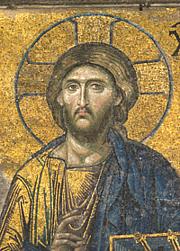
Christianity, despite its later adoption of Jewish scriptures, is essentially a powerful offshoot of the Pagans. The Jews were very resistant to converting, so early Christians were recruited mainly from the Greco / Roman culture of Asia Minor and the Near East, and later by wholesale conversion of the Pagan tribes of Europe, almost always "conversion by the sword", and destruction of Pagan shrines and temples by mob violence.
In so doing, Christianity, already a pastiche of the Cult of the Dying
God (Isis & Osirus) and whatever else was going around at the time,
adopted
a great deal of pagan culture and symbology. All the major Pagan holidays
were adopted, with a little renaming (in the case of Easter they didn't
even bother renaming) and assignment of Christian mythology to them. Some
favorite local deities were converted to saints, and Mary, mother of
Jesus, was re-formulated as a replacement for Vesta, the favorite goddess
of Rome, to make conversion easier.
Whether or not Jesus the Christ was actually a living person is still hotly debated. Unlike the Buddha of 550 years before, we don't have detailed contemporaneous records of his life, appearance, travels and dietary preferences. Despite high hopes, no certifiable physical evidence has been found by modern archaeology - nor was any found by Origen (185 - 254 CE), an early and influential father of the Church. The earliest datable fragment of a Christian manuscript is from a little before 256 CE.
This point, however, is of almost no importance - relevant only to our current very literal age. It would have been of little interest in the time of Christianity's founding - but if he was actually born it was in the spring, not at Christmas time. Tax time during the Roman Empire was in the spring as it is today, and shepherds and their flocks would not have been out in the hills in winter.
The birth of Jesus was conveniently assigned to Saturnalia / Sol Invictus, a holidays the Pagans were not about to give up. Despite a few manger scenes and Christmas carols, our current Christmas celebration is far more in keeping with the Saternalia than it is with any specifically Christian ritual.
This serves as an example of how Christianity, already descended largely from Pagan (and possibly Jain and Buddhist) thought, adapted rather freely to the cultures it absorbed. Egypt, on the other hand, held to it's traditional religion until the (by then Christian) Roman Emperor decreed a death penalty for anyone who did so, and enforced it.
Ambitious Christian leaders, however, finding in Christ's doctrine no justification for a powerful authoritarian church, fixed that by adopting the vigorously authoritarian Jewish scriptures and tacking their own material onto the back end of it. In my opinion this Old Testament material should be ignored by anyone calling themselves Christian, and some sects do reject it.
There aren't any rules. Christians eat and drink whatever they please, and generally base their regional cuisines on what is available economically and what was eaten by their non-Christian ancestors - as well as adapting the rituals and symbology of their ancestry into Christianity.
In an event some years ago in South America, survivors of a plane crash resorted to eating non-survivors to continue surviving (the non survivors were frozen, so did not spoil). After their rescue it was found they would not be punished in the hereafter because the Catholic Church has no prohibitions even against eating people, though neither the Church nor I (see Human) recommend the practice.
Such a prohibition would sort of conflict with the ritual of the Eucharist where the wine and wafer are magically transubstantiated into the blood and body of the Christ, now wouldn't it?
It is true though, a few sects do take the Jewish material more seriously and make at least a half hearted attempt to adhere to Jewish dietary laws, but as I've already mentioned, inclusion of this material into Christianity is rather questionable.
christ.html 080129
©Andrew Grygus
- ajg@clovegarden.com - Linking and non-commercial use permitted